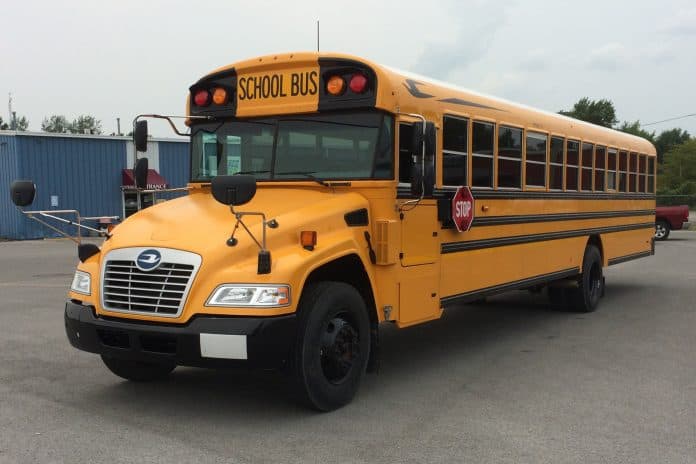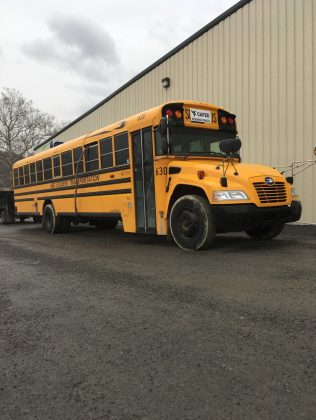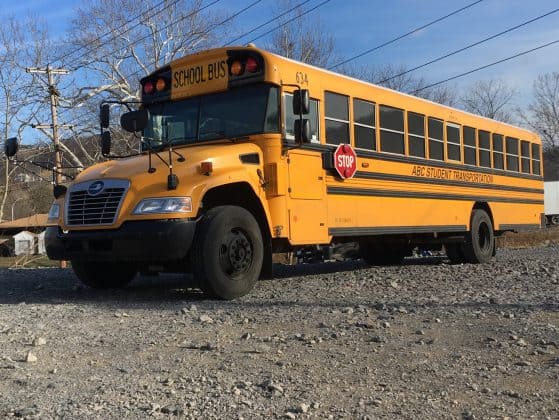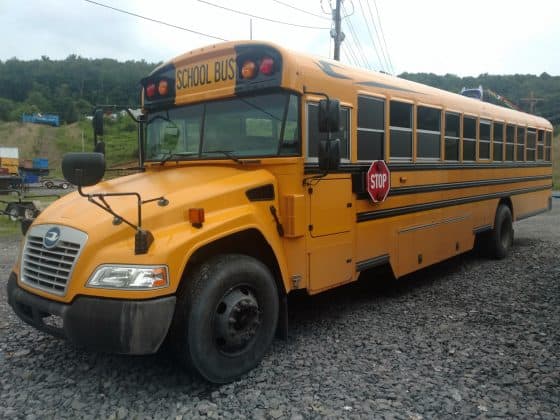A year-long study performed by the nonprofit Center for Alternative Fuels, Engines and Emissions (CAFEE) at West Virginia University, and commissioned by the propane industry, concluded that emissions from propane-powered school buses are significantly lower than emissions from diesel school buses.
CAFEE researchers used four school bus test vehicles last year to establish exhaust emissions and performance characteristics of propane-fueled vehicles. In all, the researchers gathered data from a total of 36 test routes.
Portable emissions measurement tests were run on all four engines with both hot and cold starts. The tests included a Horiba OBS-2200 gaseous Portable Emissions Measurement System (PEMS) for a 2015 propane and a 2014 diesel bus in January and February 2018, plus a Horiba OBS-ONE gaseous PEMS for the 2017 propane and diesel buses in July and August of that year.
The CAFEE study said the devices are approved by the U.S. Environmental Protection Agency heavy-duty, in-use standards. The devices also and comply with European Union 582/2011 in-use emissions measurement standards, and the gaseous and particulate exhaust test under Title 40 CFR Part 1065 Subpart J – “Field Testing and Portable Emission Measurement System.” The test gauged the levels of carbon dioxides (CO2), oxides of nitrogen (NOx) and hydrocarbons (HC).
The researchers concluded that NOx emissions were 15 to 19 times higher for the diesel school buses during routes on city and highway roads, while the propane buses reduced NOx by 95 percent.
Meanwhile, the researchers found that NOx emissions were 34 times higher for the diesel school buses on stop-and-go routes. The propane buses reduced NOx by 96 percent and CO2 by 13 percent.
Study Details
The research first used the PEMS instrumentation to compare a 2015 Blue Bird Vision Propane with 35,492 miles on the odometer, and a three-way catalyst after-treatment system, with a 2014 Blue Bird Vision diesel bus with an odometer reading of 57,666 miles and a diesel oxidation catalyst (DOC), diesel particulate filter (DPF) and selective catalytic reduction (SCR).
Those tests were conducted in January and February of 2018. The buses completed two types of tests at different times on routes that included city and highway driving and stop-and-go travel through an industrial park to mimic standard school bus operation.
The researchers concluded that low ambient temperatures during the tests of the 2014 diesel bus and the 2015 propane bus “may have exacerbated the NOx emissions from the diesel school bus in addition to the low speed, low load operation contained in these routes and the inherent difficulties to maintain adequate temperatures in the SCR system.”
They also found that distance-specific carbon monoxide (CO) emissions measured from the 2015 propane bus were greater than those emissions from the 2014 diesel bus for all routes. However, the researchers pointed out that since 2010 there have been no nonattainment areas for CO in the U.S.
In July and August 2018, the researchers decided to perform additional tests to determine the validity of the first set of results. This time, they used a 2017 Blue Bird Vision Propane with 2,497 miles on the odometer and the three-way catalyst after-treatment system, versus a 2017 Blue Bird Vision diesel with 4,057 miles on the odometer and an after-treatment system consisting of a DOC, DPF and SCR.
Results from the second set of tests validated the findings from the first group, the study concluded.
Related: Can School Bus Emissions Retrofits Improve Student Test Scores?
Related: University Study Finds NatGas Beats Diesel in Low-Duty NOx
Related: Zero Emissions School Buses Make Cents
Related: New Bus Purchase Grants Shelve Some Refurbishment Projects
Related: Cummins Says Renewable Diesel Reaching ‘Commercial Maturity’
Dr. Ross Ryskamp, the associate director for testing and development at CAFEE, explained to School Transportation News that a compression-ignited diesel engine inherently emits lower levels of CO than a spark-ignited propane engine. However, the catalytic converter in a propane bus is more efficient at reducing NOx, while the diesel after-treatment or SCR is challenged in reducing NOx in low-speed operation.
“In real-world applications, particularly those with significant low speed or low load operation, propane vehicles can provide dramatically lower NOx emissions, compared to similar diesel vehicles,” Ryskamp added. “These findings are significant, due to the fact that NOx and ozone are major nonattainment concerns for many areas across the nation.”
Ryskamp said that the findings from the in-use tests of high NOx emissions for medium- and heavy-duty diesel vehicles are supported by other published studies. Those studies include the South Coast Air Quality Management District in California on port drayage and delivery vehicles that operate in low-speed and low-load conditions, which are similar to school buses.
“This study is monumental from an emissions and health perspective for students, schools and communities across the country,” said Tucker Perkins, president and CEO of the Propane Education & Research Council (PERC), which commissioned the study. “Children arriving at school in propane buses aren’t exposed to harmful NOx emissions. They feel better and are more prepared to learn.”
PERC said over 900 school districts across the U.S. are currently operating propane school buses that transport nearly 1 million students to and from school.
“We’re seeing the unmatched benefits of propane and how advanced this domestically produced fuel option is,” Perkins added. “On top of decreasing emissions, these reliable vehicles offer superior performance in cold weather and low total ownership costs.”
CAFEE also conducted the research in 2015 that exposed the Volkswagen diesel emissions cheat code, which resulted in a $14.7 billion settlement with the U.S. Department of Justice, from which the $2.9 billion Volkswagen Mitigation Trust Fund originated.

















